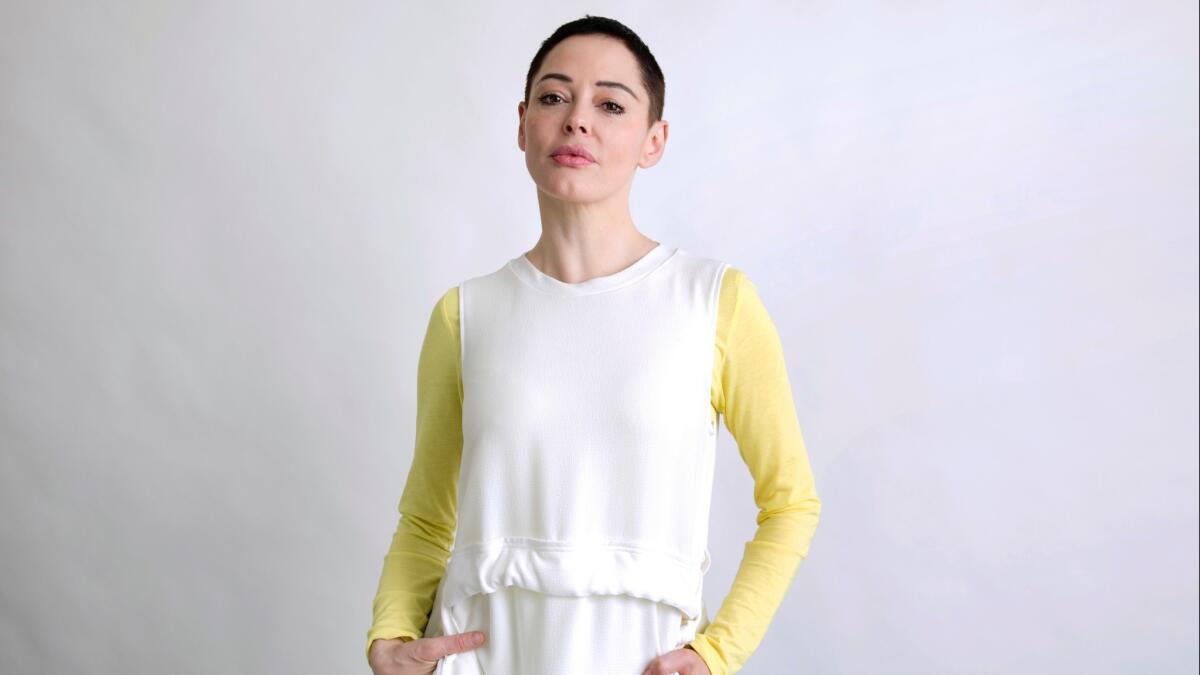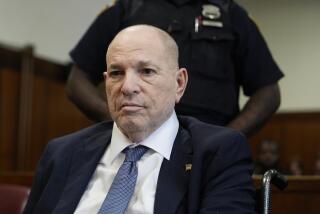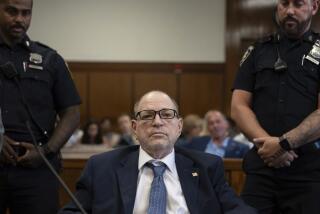Fierce, vulnerable, voluble: 36 minutes with Rose McGowan

Rose McGowan gives zero — well, you know whats. Or maybe she gives too many. Sometimes it can be hard to tell.
The author, filmmaker, musician, activist and former actress arrives an hour later than scheduled for an interview at her stylish TriBeCa hotel and asks if she can have a few minutes to go upstairs and “get human again.” Another half-hour later, she returns to the lobby wearing white adhesive patches under her eyes to reduce allergy-related puffiness which, paired with her fuzzy yellow sweater, make her resemble an exotic bird.
She’s spent the day criss-crossing Manhattan promoting her E! docu-series, “Citizen Rose”— which premiered earlier this week and returns in the spring — and the release of her memoir, “Brave.” In the book, she details, for the first time, her alleged rape at the hands of disgraced movie mogul Harvey Weinstein at the Sundance Film Festival in 1997. Weinstein has denied the allegations. She’s also had to respond to a new round of attacks from “her monster,” as she refers to Weinstein, whose lawyers have released emails written by Ben Affleck and McGowan’s former manager Jill Messick in a last-ditch effort to discredit her.
The 44-year-old, who also has an album coming out this month, seems almost amused at Weinstein’s use of a crisis management team.
“I’m like, laughing. Crisis management? Dude.... Chill out. What are you paying all this money for? They’re going to bleed you dry.... You’re done.”
McGowan, who rose to fame in the 1996 horror classic “Scream,” is a bundle of contradictions — endearing yet unnerving, fierce yet vulnerable, incisive yet rambling. She is, in her own words, an optimist with a “Pollyanna brain” whose speech is liberally seasoned with F-bombs and X-rated imagery.
Weary from back-to-back interviews, McGowan says she’d rather have a real conversation than field the same handful of tedious questions about Weinstein, her beef with Meryl Streep, and what she thinks of the Time’s Up movement.
“Everybody sees the same people on talk shows saying the same damn answer and it’s always on us to come up with a different answer. Why don’t you come up with different questions? I would say ‘What’s your favorite color? What lighting makes you happy? What sounds do you most enjoy?’ You want to get to know me, ask me something. Don’t ask me basic-ass” stuff, she says.
And yet what follows isn’t an equal exchange so much as a ricocheting 30-minutes-plus monologue about an array of subjects including what Ben Affleck’s teeth say about the Hollywood machine; how CNN — “ratings mad and tacky …” — handed the election to Trump; the time she “hijacked” a political dinner in New Hampshire; the lyrics to the Weeknd’s “Earned It”; and her general disdain for “Kool-Aid pushers” and people with “khaki brains.”
At several points throughout the conversation, the former star of “Charmed” launches into bellicose, quasi-messianic speeches that make her sound like a latter-day Daenerys Targaryen. (“These men, I could break them with my pinkie. Why are they allowed to govern us, the worms?” and “I’m trying to destroy a … system that’s been around for millennia. Right now we’re running alongside of a burning bus driven by a … madman.”) A few hours later, she’ll sit for a similarly discomfiting interview on “The Late Show With Stephen Colbert,” one that she’ll defend on Twitter as “a Dick Cavett free form hangout.” And on Friday, she announced via Twitter that she was canceling the rest of her public appearances after a contentious exchange at a book reading.
McGowan’s refusal to cooperate with the celebrity-industrial complex may be unusual, but then again not many Hollywood stars have been tailed by former Israeli spies or had their book manuscripts stolen (allegedly). And given the abuse and neglect she recounts in “Brave,” it seems a miracle she’s able to leave the house.
McGowan spent the early years of her life in Tuscany, Italy, where her parents lived as members of the Children of God, a cult. Her family eventually returned to the U.S., where she was shuttled back and forth between her parents’ homes in different states, spent time in rehab and on the streets as a runaway. By 16, she was emancipated from her parents, deep in the throes of an eating disorder and living in Los Angeles with a drug-addicted 21-year-old boyfriend.
In McGowan’s rendering, Weinstein is just one of the many villains populating Hollywood, “one of the biggest cults of all.” On her first film job, she was allegedly sexually assaulted by an unnamed crew member. She portrays ex-fiancé, director Robert Rodriguez, as a possessive bully. She makes even the most quotidian aspects of the industry, like auditions and red-carpet appearances, sound like psychological torture. Her breaking point came in 2007, with a Rolling Stone cover, in which she and “Grindhouse” costar Rosario Dawson were asked to pose naked, save for strategically placed ammunition belts.
The new chapter in McGowan’s public life began around 2014 with the release of her directorial debut, “Dawn,” a short film about how men prey on young and eager-to-please girls. On Twitter, she started amassing a following by exposing Hollywood sexism, including an egregious casting notice for an Adam Sandler film. Once labeled a Hollywood bad girl, she’s remade herself as a feminist agitator who helped spark a global reckoning over sexual misconduct — a transformation that has forced the media to “do a reset,” McGowan says. “You’re not sure how to do it. You’ve been trained to dismiss me, hate me, despise me, think I was a weirdo and a trashy woman this whole time. Congratulations, well done. You guys were always on the money.”
McGowan is critical of seemingly friendly outlets like Time, which named her one of its people of the year. “That title is bull... ‘The Silence Breakers.’ ... off. I kicked your earplugs outta your head. That’s what happened. Fact.”
She says she was not surprised at the extent of Weinstein’s alleged misdeeds, and says he was enabled by a vast infrastructure.
“This was a funneling system. There was a woman paid to give him erection medicine … we were sold by people,” she says. “That’s the wild thing about all these Trump people. They’re right about Hollywood. That’s the ... up part. They’re spot-on. These fake liberals telling us what to do and thinking they’re better than us.”
Still, McGowan’s role as a “silence breaker” is also complicated. Anyone with access to Wikipedia could have figured out who she was talking about when she said “my ex sold our movie to my rapist” in an October 2016 tweet, but she didn’t publicly name Weinstein as her alleged attacker until other women went on the record in the New Yorker and the New York Times a year later.
In McGowan’s telling, this was all part of a master plan. “David Carr tried to break the story every three years. But it wasn’t time,” she says of the late New York Times writer, one of many journalists who unsuccessfully pursued the Weinstein rumors. “Systemically, people were too stupid and there was no platform to speak for myself.”
Likewise, though she reportedly sat for an interview with Ronan Farrow when he was investigating the story for NBC News, she also takes credit for killing the story at the network: “I started a cease and desist at NBC. It was me that spiked it. It wasn’t the place for it.”
But McGowan describes herself as the “architect” behind Weinstein’s downfall, saying that she encouraged other alleged victims, including Annabella Sciorra and Asia Argento, to go on the record with Farrow: “I started this.”
And she bristles at the criticism she’s received for taking a $100,000 settlement from Weinstein. “On Twitter they’re always saying” — she does a whiny tattle-tale voice — “‘you took a payment.’ And I’m like right, and I’ve lived luxuriously ever after. You stupid idiot. That was to buy and pay for a billboard. That’s what I won. Shockingly, [the outdoor advertising company she approached] would not let me. But I think I could still do it.” The message she hoped to advertise would allege that Weinstein was a rapist. (In her memoir, McGowan says most of the money went to intensive therapy and donations to a rape crisis center.)
At this point, such a billboard might not be necessary. More than 80 women have come forward with accusations against the Oscar winner, who’s been shunned by the industry that once revered him and faces multiple criminal investigations.
If McGowan has finally succeeded in slaying “her monster,” revisiting past traumas and waging daily battles on social media has taken its toll.
“People think I fire off these tweets with this rage. Sometimes. But half of the time, maybe 85%, I’m crying. It makes me cry a lot. I leak a lot. Every day,” she says, nodding her head. “It’s a lot. It’s a lot.”
See the most-read stories in Entertainment this hour »
Follow me @MeredithBlake
More to Read
The complete guide to home viewing
Get Screen Gab for everything about the TV shows and streaming movies everyone’s talking about.
You may occasionally receive promotional content from the Los Angeles Times.





